|
||||||||||
|
T'IEN HSIAA Window on the Forbidden City紫禁城之窗Interviewed by Sang Ye Translated by Linda Jaivin Revised by Geremie R. BarméThe following oral history interview is part of Sang Ye and Geremie R. Barmé’s book The Rings of Beijing, Inside Beijing’s Global Aura. It reflects the complex motivations and aspirations of a loyal local resident during the tense run-up to the 2008 Beijing Olympic Games. Teacher Zhang, a Party stalwart and former high school principal, has a gimlet eye fixed on the advantages of being selected as an Olympic Host Family. Her cupidity is cloaked in the language of assertive pride, but that does not make the patriotic ardour any less heartfelt. Her all-knowing hauteur is in conflict with an anxiety over being regarded as ‘up to the standard’, be it in the eyes of local officialdom or even by the foreigners that she is out to impress. Although more avowedly pro-Party-state than many, Teacher Zhang’s attitudes offer a fascinating insight into contemporary sentiment, one that is engaging, even if somewhat repugnant.—The Editor  Fig.1 The Palace Museum and Prospect Hill 景山 seen from Bei Chizi 北池子. (Photograph: GRB, August 2008)
Zhang Huiyun, female, fifty-seven years old, an aspiring Olympic Host in Beijing. Olympic Host Families are selected from volunteers, but you have to live in one of Beijing’s designated Eight Districts. Of these, they’re mostly looking at the main four districts—the Eastern City, the Western City, Chaoyang District and Haidian, all of which are relatively close to the Olympic venues. Strictly speaking, the central four districts are the Eastern and Western Cities, Chongwen District and Xuanwu District. Chaoyang and Haidian aren’t actually in the inner city. But it’s no use being too literal about it. The selectors for Olympic Host Families made this ruling. The reason they gave for excluding Chongwen and Xuanwu districts is that they’re too far away from the main Olympic venues. Of course, the real reason is obvious and everyone knows it, too: sure, Chongwen and Xuanwu are a tad far from the Olympic sites, but compared with Chaoyang or Haidian, Tiananmen and so on they’re right on the doorstep. 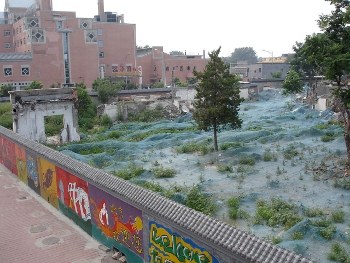 Fig.2 Qian Men under reconstruction. (Photograph: GRB, August 2008) But Chongwen and Xuanwu are poor, noisy and chaotic, with heaps of old courtyard houses that have been subdivided into multi-family slums. We are putting on our best face for the Olympics to impress all those foreigners. Let’s see how things go in those areas in the future—if they get cleaned up and develop, maybe they’ll get a shot at it next time. All in all they’re going to choose one thousand Olympic Host Families. If you want to host overseas guests during the Olympics, you’ve got to be one of the official Host Families, otherwise, forget it. Why bother with all this rigmarole if just anyone could host overseas guests? What I’m saying is that I’ve just put my name down; I haven’t been selected yet. But I’m confident I will be. No matter how you look at it, my place is pretty nicely set up for it. This program that allows overseas visitors to the Olympics to experience the home life of Beijing people is being managed by the local authorities. The idea comes from the government and a state-run travel agency will be in charge of implementation. It’s all part of the People’s Friendship Activities and A Civilised Olympics (民间友好活动和人文奥运) that are a feature of 2008. Registration opened on 11 April and closes at the end of the month, that is to say, tomorrow. The registry is at our local Neighbourhood Committee Office.[1] Once you’ve filled out your application you wait for the authorities to make their selection. Naturally, a process like this has to start with the Neighbourhood Committee. It represents the grassroots level of government and they know every last thing about you. They’ve got a good knowledge of your political attitude and your financial situation, as well as your overall behaviour. If we’re chosen to be an Olympic Host, we’ll be providing a home-stay for some overseas visitors for the two months from 1 August to 31 September. Of course, ‘overseas’ doesn’t necessarily mean foreigners; they could be from Hong Kong or Taiwan. But I’m pretty sure they’ll be foreign types. Hong Kong and Taiwan people would have their own friends or relatives to stay with, don’t you think? I can’t imagine they’d bother coming just to see how people in Beijing live. Although people could only formally register their interest this month, Neighbourhood Committees have been onto it for a year already. Reading the official Guidelines for Olympic Host Families posted in the office of our local committee I got a strong impression they’d be pretty strict. If you weren’t up to standard, you’d just be wasting your time. So, at first, I didn’t think of signing up. 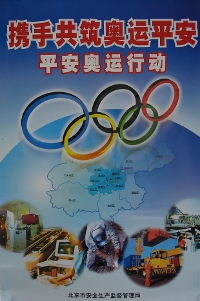 Fig.3 A poster promoting the Secure Olympics Action, Huairou county. (Photograph: GRB, August 2008) Frankly, I didn’t think my home was up to scratch. It’s pretty average in fact: three bedrooms and a living room in an old tower block. The elevator is the kind that needs an operator, and the young girl who has the job locks it up whenever she goes off to eat or even have a pee. Apart from that, it’s always breaking down, leaving us all to climb up the stairs, and I live on the fourteenth floor! Then, a few days ago, I was watching the news and saw an interview with someone who’d put himself up to be a Host. He said that the best feature of his place was that it was in Anhui Lane, only a ten-minute walk from the Bird’s Nest Stadium, really close. And there was this other person who was even more of a hoot: he said his strong point was his English—he had lots of practice because he worked at the zoo and often met foreigners. So, I said to my Old Man, if that’s what they call strong points, then we’re in with a chance. The appartments in Anhui Lane aren’t a patch on ours. So I got to thinking. I asked my neighbourhood committee how many people had signed up and they told me that quite a few had put their names down. ‘But, Teacher Zhang’, they said, ‘we really think you should be in the running. After all, you’re an official ‘Five Good Family’ 五好家庭.[2] We think your political and economic circumstances are excellent, too. If you become an Olympic Host Family, it’ll bring glory to you and to the neighbourhood as well.’ ‘But that the elevator in my building alone would disqualify me,’ I responded. I told them that I’d complained about it numerous times, but the property managers just turned a deaf ear. The committee people said that if I was chosen they’d look after the hardware; they’d negotiate a deal with the real estate company to make sure that the elevator was manned twenty-four hours a day. ‘We won’t let an elevator lose face for the people of Beijing,’ they told me. So, I thought about it and went over the ins and outs of it all and here I am today to put my name down and fill out the application. But, as I was saying just now to the comrades here, the reason I’m applying has nothing to do with money. Sure, I know that as a host you get four hundred yuan a day to cover rent—or six hundred if you’re considered to be top-tier. But I’m not interested just in renting a room to foreigners. For one thing they smell gamey, and besides the rent money would only cover the renovations we’re expected to do to comply with the regulations; we wouldn’t be making a cent. No, I’m doing this because the foreign media has ganged up on China and insulted us. They’ve even incited Tibetans to steal our Olympic Torch. I love my country. I want to show those foreigners Chinese pride and attitude. They need to know that we’re not the least bit poor, nor the least bit scared, and that it’s a very bad idea to mess with the Chinese. The comrades here have told me that’s exactly what everyone is saying; no one’s in it for the money. I’m as clear as day in my own head about all this. Besides, it’s obvious how the financial side of it’s supposed to work. You use the rent you’ll be getting to carry out your renovations, there’s no profit in it. You’ll never be chosen if you refuse to renovate. So, in the end it all comes down to patriotism: if you didn’t love your country why would you put yourself to all that trouble? I started out as a primary-school teacher. Later I was made a vice-principal. I’m quite a practiced hand at survey and research work. So, before putting my name down I went to have a look at a model Olympic Host home in Beichen Area. They’ve stolen a march on us over there; they made their selections this time last year and picked a few homes for us to study as models. The place I saw was in a pretty good a location, maybe a kilometre or so from the Bird’s Nest—all you had to do was draw back the curtains and there it was. Originally, the apartment had four small bedrooms and a living room. During the renovations they knocked out half a wall and converted two of the smaller bedrooms into a large bedroom with an en suite and a small sitting area for the foreigners. They renovated the whole flat, painted the walls and fixed the flooring and replaced pretty much all the furniture. They also bought the foreigners a Simmons mattress at IKEA. 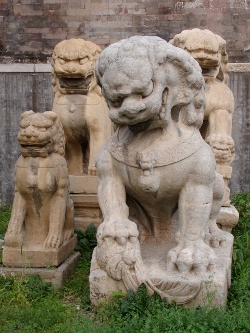 Fig.4 Lions near the Hall of Martial Valour (Wuying Dian 武英殿), the Palace Museum. (Photograph: GRB, August 2008) Afterwards, I said to the Old Man, ‘Except for the fact that they’re in a much better location, we can do better than them.’ ‘Sure’, the Old Man replied, ‘and since the fee we’ll get obviously won’t cover the whole cost, we should throw in some extra ourselves—we’ll do it for the motherland. Renovations and Olympics, they’re a one-off. Besides, once the foreigners have gone, we still get to enjoy the renovations.’ I had a careful look around when we got back home. I told the Old Man that we should ‘seek truth from facts’ and be honest with ourselves: neither the location nor the size of our apartment would qualify us as a top-tier property. So we should aim to make the average, say a little over 20,000 yuan worth of rent. So that means when we talk about adding a bit like you suggested 20,000 should be our starting figure. After they leave, we still have to live here, so we don’t want to overreach ourselves. What we kick in will count as our way of sharing the national burden while improving our own standard of living—we can kill two birds with one stone. Besides, if we were to do a luxury refit of this place, it’d cost so much that after the foreigners leave we’d be sitting naked on our sofa and eating maize buns in front of a colour television—our standard of living would be lower than it is now! The Old Man said I was talking nonsense—maize buns are more expensive than steamed buns made with white flour these days. I told him not to be so literal. I’m talking the principle of the thing, I said. When I say ‘maize buns’ I’m using the phrase as an analogy. That’s why our renovations won’t change the basic layout of the place. There’s no need to set the foreigners up with their own suite or anything like that. After all, they don’t necessarily live like that in their own countries. It’ll be good enough if we can give them a bedroom of their own, one that conforms to the official standards for Olympic Hosts. So we agreed that we’d concentrate on basic renovations. Our building is already over ten years old, the wallpaper in our apartment has cracked and the paint is peeling. The concrete floor is uneven, too. So we’d be focusing on a paint job, laying new carpets and buying new furniture. The kitchen and bathroom would also be priorities. Our kitchen is filthy—grease-splattered and discoloured with smoke. After cleaning the walls we’d tile it and put in a new stove and a microwave. The bathroom is even worse. The pipes have been leaking for ages. We’d have to have them completely replaced. We’d also buy a hot water heater—foreigners won’t take cold showers. And we’d tile the bathroom, too. The most important thing would be to change the squat toilet to the kind you sit on. The Old Man isn’t too happy about that. He said, I’ve been squatting my whole life and I’ll never get used to sitting. I said this is a basic requirement for Olympic Hosts. If you make foreigners squat they can’t shit. I told him he could just squat on top of the toilet seat—once the door’s closed, the foreigners won’t see how you’re you’re doing your business. The truth is that I’m going to have to squat on top of the seat, too; I’m not used to seated toilets myself. As for afterwards, one possibility is that we’ll have got used to shitting while seated. If not, we can change back to a squat. According to the guidelines, the basic requirements are that you can provide the foreigners a room of their own, that you have at least one person in the family who speaks a foreign language and that you’re able to provide essentials. If you want to get down to the nitty-gritty, in the guidelines there’s loads of detail about the amenities you’re supposed to provide with the room, as well as about the kitchen setup, food hygiene, the local environment, the expected standard of courtesy within the family, the overall cultural atmosphere, security and safety, etcetera etcetera—there’s twenty-one provisions spread over nine categories. It’s all extremely detailed. 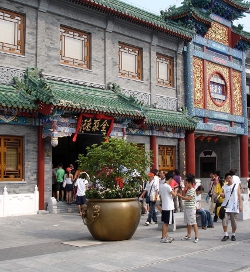 Fig.5 Quanjude 全聚德, a famous Peking Duck restaurant chain, Qian Men. (Photograph: GRB, August 2008) But, my understanding is that, besides having passable hardware, the most important thing is cleanliness and a smiling face—to give them a personal experience of an ordinary Beijing household. So, if a foreigner were to ask, I’d say that our house was quite average and that most Beijing people live like us. In fact, many have a far higher living standard, but they’re not renting out rooms. What kind of idiot do you think I am?—Of course I wouldn’t tell them that I’d renovated the place especially for them. I’m a Buddhist and regardless of whether you're a member of the sangha or a layperson you know you have to obey the injunction against arrogant talk. I wouldn’t say a word unless the foreigner asked me directly, in which case I’d tell him that the renovations weren’t undertaken for them; after all, I’ll still be living here after they leave. Worst case scenario: I’ll just fudge it, and that’s not the same as lying. Anyway, we really will be bona fide Olympic Hosts, completely committed to looking after our guests. The few minor renovations we’re envisaging are entirely for the sake of making the visitors feel at ease. Anyway, without them the foreigners wouldn’t be happy. These days government processes are far more transparent. The selection of Olympic Hosts starts with voluntary registration at the Neighbourhood Committee Office after which the District Olympic Host Family Selection Committee collects the applications. Once they’ve sifted through the recommendations they approach the Neighbourhood Committees and local police stations to investigate further. Then the district reports their findings to the Municipal Olympic Host Family Selection Committee. It’s up to the Municipal Committee to coordinate the formal badging of Olympic Host Families. The approved families will then be inducted through a training program overseen by the appropriate departments covering such things as international courtesy and customs, the basics of hygiene and security awareness.
I think the procedure is good, completely appropriate. We’re a socialist country, after all, so the government and the police need to oversee the selection process, otherwise we might end up with Uighur ‘splittists’,[3] Taiwan independence agitators and other terrorists sneaking in to cause trouble. That includes those Falungong-ers who are busy scheming and plotting to wreck our Olympics. How could the authorities be certain that the people in families are good citizens if they don’t carry out appropriate investigations? And, if you are a good person, why would you be worried about a routine background check? We’re certainly not afraid of being investigated. Both the Old Man and I are members of the Communist Party. Our son, who works in another province, is also a Party member. On top of that, we’re an official ‘Five Good’ Family. The Olympics provides a window onto Beijing. It’s important that only good families who are politically reliable and enjoy a decent standard of living shoulder this responsibility. It’s vitally important that no bad people or individuals with hidden agendas, or other backwards types sneak through the vetting process. If such people got through, at the very least they’d spread rumours among the foreigners that the homes they were seeing were fake, that they were fixed up specially for them, and who knows what else—they might even espouse Uighur splittism, Taiwan independence or belief in Falungong. Before he retired, my Old Man was the head of a factory workshop. He hadn’t even finished primary school when the Cultural Revolution began. He’s pretty garrulous but doesn’t speak a word of any foreign language. I, on the other hand, went to a teachers’ college after the Cultural Revolution finished, and learned a few sentences of English. But after that I taught primary school and then went on to become a vice-principal in charge of administration. I forgot everything I’d learned. So as for the stipulation that you’ve got to have at least one person at home who speaks a foreign language, we’re a wee bit short of the mark. On the other hand, according to the rules, you just need one family member who speaks a foreign language; my younger sister’s daughter, who’s graduating from university this year, can speak English. So I’ll be getting her to come live with us for two months. She’ll count as a member of the household. 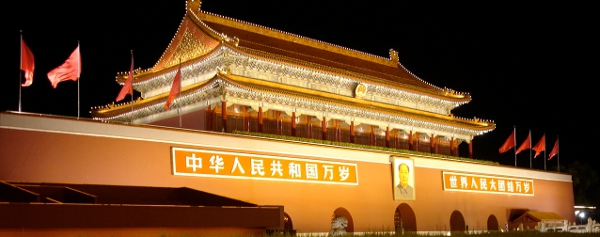 Fig.6 Tiananmen Gate during the Olympic month. (Photograph: GRB, August 2008)
It’s not as though I don’t know any English at all. I’ve been going to the foreign language classes they’ve been putting on for Beijing residents in preparation for the Olympics. And I bought a copy of The Olympics English Sign Language Training Manual. I didn’t learn any of the sign language—I don’t think it’s likely they’ll be sending us a foreign deaf-mute. I just concentrated on the English. When the foreigner arrives, I’ll greet him with ‘Welcome to Beijing! Welcome to home!’ That’s not too bad, is it? Providing a place is only one aspect of being a host family. Food is important too. In China we have a broad and sophisticated repertoire when it comes to eating: we’re number one in the world. The first meal I’ll serve our foreigner will be steamed dumplings. They wouldn’t have them where he comes from, would they? Then, after the meal, I’ll let him go to sleep. As they say, ‘For a good meal, dumplings can’t be beat; for a good rest, just get off those feet.’ Our family’s got the edge when it comes to food, and I made a particular point of this in my application: my dad was a chef. So I’m a good cook. I do mainly home-cooked dishes like ‘slippery pork’,[4] stewed tofu and things like that. Such home cooking is sure to seem fantastic to a foreigner. And while we’re on the subject of feeding foreigners, I also bought a copy of the Handbook of Olympics Knowledge produced by the Beijing Olympic Committee. Reading it has given me a pretty thorough grasp of the eating habits of foreigners. For instance, they don’t eat lungs, intestines or stomachs; they don’t eat donkey or dog meat; when you stew meat it’s best to remove the bones; and when you fry fish it’s best to fillet it first. I emphasised my understanding of this as a point in my favour on the application form. Aside from home-cooked meals, we’d also take the foreigner out for Peking Duck and Mongolian Hot-Pot, as well as to an evening of Peking Opera. I know the rent money wouldn’t cover things like this, but I’m happy to do it. I’m glad to have a chance to introduce them to the best of our nation’s culture so that after they go home they’ll adopt a friendly attitude towards us and not believe the fabrications of the foreign media. As for the Old Man, you could say he’s a man of leisure. These last few years, I’ve taken care of our domestic affairs as well as things outside the home. But I’ve decided that he can be useful; I’ve put him in charge of supervising the workers who’ll be doing the renovations. He has to make sure they don’t get up to any tricks or try and cheat us. He’s got another task, too: to study the bit in the Handbook of Olympics Knowledge where it says you can toast a foreign guest with alcohol, but you mustn’t force them to drink against their will, and you mustn’t under any circumstances offer them cigarettes. Forcing people to drink and pushing cigarettes on them are bad habits that my Old Man has. He needs to reform. 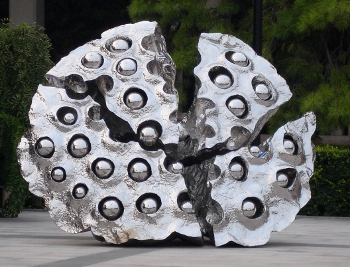 Fig.7 Lotus sculpture outside the China Art Museum. (Photograph: GRB, August 2008) I’m not afraid of foreigners. Apart from their body odour, they’re just people like us, and what’s there to be afraid of when people get to know one another? Even if they allocate us one of those black brothers, I wouldn’t be scared. Besides, according to the regulations, the national travel service will organise the Olympic home-stays; they visitors will arrive as a group and leave as a group. So, even while they’re staying in my house, there’ll still be people in charge of them. And there’s the police too, of course. No matter what kind of threat they represented,[5] I’d just have to report them to the police; they’d sort them out. Other tourists? As an Olympic Host with foreign guests, I’d be a tourist attraction in my own right, a window into the home life of Beijing people. If other foreigners want to come in to take a look, they’d be welcome. By then the place will be completely renovated. If people drop by I’ll ask them in and serve them Chinese tea. If they‘re accompanied by a translator or whatever, it’d certainly be no problem; if they’re just by themselves that’d be a real problem. Apart from ‘Welcome to Beijing!’ and ‘Welcome to Home!’ I couldn’t say another word. I’d be scared I couldn’t work out what was happening. Besides, this wouldn’t be their official Home, it’d be complicated. I think I’d wait to receive co-ordinated training from the Olympics authorities before working out how best to receive foreigners who just wanted to pop in for a look: I’ll have to look into this. They should provide us with a special lesson devoted to this subject. What if some foreigner insisted on going to have a look at someone’s house? Would you want them wandering up and down the streets and deciding on the spot which house they wanted to see? That wouldn’t do at all. It’s important to distinguish between us and them. Why should foreigners be allowed to see whoever’s house they feel like seeing? What if the family isn’t prepared for the visit? What if the house was dirty, messy and substandard? Or what if the family wasn’t politically reliable? There’s no way you could allow that. Besides, foreigners don’t have a right to just visit any home they please. This is Beijing, not Iraq. They can’t just barge in without an invitation. They don’t have the right to say, I’m going to have a look at your home so you have to let me in. It would be the same the other way around. For example, if I went to New York without knowing anyone there and I said, I’ve never seen how you conduct family life here so take me to your home for a look, would they let me in? No way. They’d think I was crazy. They’d have me arrested. So that’s it. Let’s have another look at the government’s Guidelines for Olympic Host Families: Not a problem. Of course we’ll furnish it nicely, and we’ll buy a new air-conditioner for them. Those things really eat up electricity, though. Cheap to buy, expensive to run. Once the foreigner leaves we won’t use it. After the renovations we’ll have the lot. So not a problem. What a waste of breath!—these are basics. Besides, we’ll be buying new curtains and furniture. We’ve got everything except a water cooler. We’ll buy one. This doesn’t present a problem either. I’ll mother the foreigners on behalf of the Olympics. We’re renovating our kitchen, and we’ll be buying new appliances as well as a dining table and chairs, plates and cutlery, glasses and serving dishes sterilised to the appropriate standard—no problem. We’ll get one of those ultra-violet sterilisers to meet the standard; they only cost a few hundred yuan. That’s part of the macro-environment; once the Neighbourhood Committee has taken measures for reform and consolidation, and says there’s no more problems, that’s that. We don’t have any dogs or cats—that’s a tick. Forget the Old Man and me, you can go back three generations and you won’t find any communicable diseases or any crazies either—tick. When the time comes, my sister’s daughter will move in and we’ll have this one sorted as well. Ha, another blast of hot air. I’m a retired People’s Teacher. Even without foreigners around I emphasise civilised behaviour. And I don’t get around in rags. It really comes down to the fact that Muslims don’t eat pork, doesn’t it? So if the foreigner says he’s Muslim, I’ll buy beef and lamb. No problem. I already have a heap of promo stuff on the Olympics. I have a flashlight. I need to buy an emergency lamp and a fire extinguisher. I know all about emergency response measures because I always had to teach the kids at school that stuff. Besides, once the Olympic Hosts start getting coordinated training, I’ll have an even better grasp of it. This is something we’ll be doing as a matter of course. You always have to be on your guard, and maintain heightened vigilance around foreigners. Anyway, this item doesn’t require any improvements in our family hardware, so no problem. As you can see, my home not only satisfies the minimum requirements; it is absolutely up to standard. I’m not boasting or exaggerating when I say that. It’s true, I’m extremely confident. The other day they said on the news that there were a lot of families signing up to be Olympic Hosts. They said that if you really want to be selected, you have to offer something really special. For example, if you’re a collector, or if you know all about Chinese medicine and medicinal herbs, or you’re a musical or sporting family, that sort of thing, then your chances are that much better. I’m sure that’s true. But it’s as clear as day to me: the most important thing they’re looking for is political reliability. If you’re one of those Falungong-ers or you’ve got links to the ‘Three Trouble-making Forces’, it wouldn’t matter how brilliantly special your home was, when it came time for the Neighbourhood Committee and police to assess risk, you’ll be struck from the list. Why would they help someone like that fix up their house? Why would they help you to hook up with foreigners to carry out counter-revolutionary activities? That’s why I’m confident. I am certain I’ll succeed. Our family’s hardware isn’t going to be a problem, and our software is even better. We’re all members of the Communist Party and a ‘Five Good Family’ besides. Teacher Zhang and her family failed to make the grade. Fig.8 The ‘Bird’s Nest’ National Stadium on 8 August 2008. (Photograph: Lois Conner, August 2008)
Notes:[1] Neighbourhood Committees (Shequ jumin weiyuanhui 社区居民委员会 or Juweihui for short) are the grass-roots level of government and social organisation in Chinese towns and cities. The committees work with the local police and other authorities to manage, oversee and, when deemed necessary, interfere in the affairs of residents. [2] The designation ‘Five Good Family’ (Wuhao jiating 五好家庭) is bestowed in accordance with standards set by the Party Department of Propaganda, Ministry of Culture, Public Security Bureau, People’s Government, Ministry of Health and other authorities. Such officially acclaimed households are deemed to be: 1) Good at loving the country, acting within the law and being enthusiastic about the public good; 2) Good at studying, forging ahead, industrious and hard-working; 3) Good at achieving equality between men and women, respecting elders and loving children; 4) Good at the ethical transformation of society and having fewer but healthier babies; and, 5) Good at being frugal and looking after the environment. [3] Advocates of an independent Xinjiang, or East Turkestan. [4] A pork and mushroom dish flavoured with leek and ginger that is typical of northern-style Chinese home cooking. [5] Literally the ‘Three [trouble-making] forces’ (sangu shili 三股势力): extreme religious forces; forces for ethnic splittism; and, international terrorist forces. |